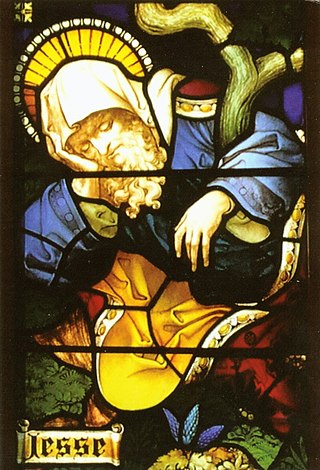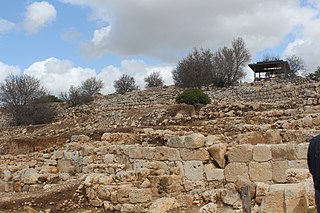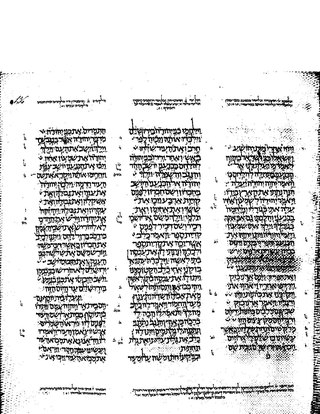Related Research Articles

The Book of Samuel is a book in the Hebrew Bible, found as two books in the Old Testament. The book is part of the Deuteronomistic history, a series of books that constitute a theological history of the Israelites and that aim to explain God's law for Israel under the guidance of the prophets.

Saul was a monarch of ancient Israel and Judah and the first king of the United Monarchy, according to the Hebrew Bible and Old Testament. His reign, traditionally placed in the late eleventh century BCE, supposedly marked the transition of the Israelites from a scattered tribal society ruled by various judges to organized statehood.

Samuel is a figure who, in the narratives of the Hebrew Bible, plays a key role in the transition from the biblical judges to the United Kingdom of Israel under Saul, and again in the monarchy's transition from Saul to David. He is venerated as a prophet in Judaism, Christianity, and Islam. In addition to his role in the Bible, Samuel is mentioned in Jewish rabbinical literature, in the Christian New Testament, and in the second chapter of the Quran. He is also treated in the fifth through seventh books of Antiquities of the Jews, written by the Jewish scholar Josephus in the first century. He is first called "the Seer" in 1 Samuel 9:9.

Bethel was an ancient Israelite city and sacred space that is frequently mentioned in the Hebrew Bible.

Jesse or Yishai is a figure described in the Hebrew Bible as the father of David, who became the king of the Israelites. His son David is sometimes called simply "Son of Jesse". The role as both father of King David and ancestor of Jesus has been used in various depictions in art, e.g. as the Tree of Jesse or in hymns like "Lo, how a rose e'er blooming."

Shiloh was an ancient city and sanctuary in ancient Israel located in the region of Samaria. According to the Hebrew Bible, Shiloh was one of the main centers of Israelite worship during the pre-monarchic period, before the First Temple in Jerusalem was built. After the Israelite conquest of Canaan, the Tabernacle was moved to Shiloh, and remained there during the period of the biblical judges.

Ramathaim-Zophim, also called Ramah and Ramatha in the Douay–Rheims Bible translation, is a city from the Hebrew Bible, the home town and resting place of prophet Samuel. The name of the town means "the heights of the views."

Eben-Ezer is a location that is mentioned by the Books of Samuel as the scene of battles between the Israelites and Philistines. It is specified as having been less than a day's journey by foot from Shiloh, near Aphek, in the neighbourhood of Mizpah, near the western entrance of the pass of Bethoron. Its location has not been identified in modern times with much certainty, with some identifying it with Beit Iksa, and others with Dayr Aban.

The Tomb of Samuel, commonly known as Nebi Samuel or Nebi Samwil, is the traditional burial site of the biblical prophet Samuel, atop a steep hill at an elevation of 908 m (2,979 ft) above sea level, in the Palestinian village of Nabi Samwil, in the West Bank.
Ramah was, according to the Hebrew Bible, a city in ancient Israel in the land allocated to the tribe of Benjamin. It was located near Gibeon and Mizpah to the West, Gibeah to the South, and Geba to the East.
Mizpah was a place in Gilead, so named by Laban, who overtook Jacob at this spot on his return to Israel from Padan-aram. Here Jacob and Laban set up their memorial cairn of stones and a pillar (Massebah) to serve to separate them: both as a boundary landmark and as a witness for their covenant and the protection of Laban's daughters Rachel and Leah.

Mizpah was a city of the tribe of Benjamin referred to in the Hebrew Bible.

Tell en-Nasbeh, likely the biblical city of Mizpah in Benjamin, is a 3.2 hectare tell located on a low plateau 12 kilometers (7.5 mi) northwest of Jerusalem in the West Bank. The site lies adjacent to an ancient roadway connecting Jerusalem with the northern hill country, which is how Tell en-Nasbeh gained importance as Judah's northern border fortress during its prime phase of occupation in the Iron Age II. There are also archaeological remains at the site and in surrounding cave tombs that have been dated to the Early Bronze I, Iron I, Babylonian and Persian, Hellenistic, Roman and Byzantine Periods.
Jaazaniah or Jezaniah is a biblical Hebrew personal name that appears in the Bible for several different individuals, and has been found on an onyx seal dating from the 6th century BCE.

From Dan to Beersheba is a biblical phrase used nine times in the Hebrew Bible to refer to the settled areas of the Tribes of Israel between Dan in the North and Beersheba in the South. The term contributed to the position that was used by British politicians during negotiation of the British Mandate for Palestine following World War I.

Judges 21 is the twenty-first chapter of the Book of Judges in the Old Testament or the Hebrew Bible. According to Jewish tradition the book was attributed to the prophet Samuel, but modern scholars view it as part of the Deuteronomistic History, which spans in the books of Deuteronomy to 2 Kings, attributed to nationalistic and devotedly Yahwistic writers during the time of the reformer Judean king Josiah in the 7th century BCE. This chapter records the war between the tribe of Benjamin and the other eleven tribes of Israel, belonging to a section comprising Judges 17 to 21.

The episode of the Levite's concubine, also known as the Benjamite War, in Judges 19–21 concerns a Levite from Ephraim and his concubine. They travel through the Benjamite city of Gibeah and are assailed by a mob, who wish to gang-rape the Levite. He turns his concubine over to the crowd, and they rape her until she collapses. After she dies from her ill treatment, the Levite dismembers her body and presents the remains to the other tribes of Israel. Outraged by the incident, the tribes swear that none shall give his daughter to the Benjamites for marriage, and launch a war which nearly wipes out the tribe, leaving only 600 surviving men. However, the punitive expedition is overcome by remorse, fearing that it will cause the extinction of an entire tribe. To ensure the survival of the Benjamite tribe while still complying with their oath, the Levites pillage and massacre the city of Jabesh-Gilead, none of whose residents partook in the war or in the vow, and capture its 400 maidens as wives for the Benjamites. The 200 men still lacking women are subtly allowed to abduct the maidens dancing at Shiloh.

Judges 20 is the twentieth chapter of the Book of Judges in the Old Testament or the Hebrew Bible. According to Jewish tradition the book was attributed to the prophet Samuel, but modern scholars view it as part of the Deuteronomistic History, which spans in the books of Deuteronomy to 2 Kings, attributed to nationalistic and devotedly Yahwistic writers during the time of the reformer Judean king Josiah in 7th century BCE. This chapter records the war between the tribe of Benjamin and the other eleven tribes of Israel, belonging to a section comprising Judges 17 to 21.

1 Samuel 7 is the seventh chapter of the First Book of Samuel in the Old Testament of the Christian Bible or the first part of the Books of Samuel in the Hebrew Bible. According to Jewish tradition the book was attributed to the prophet Samuel, with additions by the prophets Gad and Nathan, but modern scholars view it as a composition of a number of independent texts of various ages from c. 630–540 BCE. This chapter records a victory of Israel under the leadership of Samuel against the Philistines as part of the "Ark Narrative" within a section concerning the life of Samuel, and also as part of a section comprising 1 Samuel 7–15 which records the rise of the monarchy in Israel and the account of the first years of King Saul.
War in the Hebrew Bible concerns any military engagement narrated or discussed in the Hebrew Bible, also known as the Tanakh or Old Testament of the Bible. Texts about war in the Hebrew Bible are part of the broader topic of The Bible and violence. They cover a wide range of topics from detailed battle reports including weapons and tactics used, numbers of combatants involved, and casualties experienced, to discussions of motives and justifications for war, the sacred and secular aspects of war, descriptions and considerations of what in modern times would be considered war crimes such as genocide or wartime sexual violence, and reflections on wars that have happened, or predictions, visions or imaginations of wars that are yet to come.
References
- ↑ Keimer, Kyle H. (2020). "Ritual or Military Action?: Interpreting Israel's Muster at Mizpah in 1 Sam 7:2-17". Vetus Testamentum. 70 (4–5): 620–633. doi:10.1163/15685330-12341411. ISSN 0042-4935.
